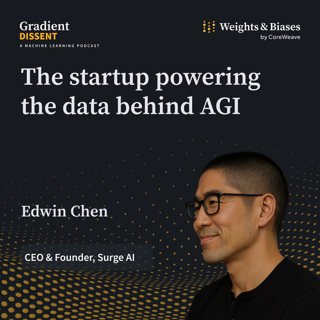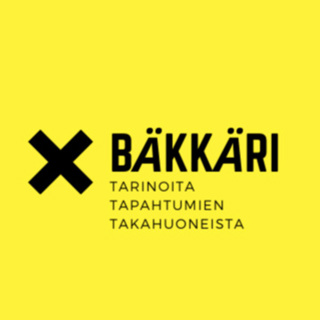
Navigating the Vector Database Landscape with Pinecone's Edo Liberty
🚀 This episode of Gradient Dissent welcomes Edo Liberty, the mind behind Pinecone's revolutionary vector database technology.As a former leader at Amazon AI Labs and Yahoo's New York lab, Edo Liberty's extensive background in AI research and development showcases the complexities behind vector databases and their essential role in enhancing AI's capabilities.Discover the pivotal moments and key decisions that have defined Pinecone's journey, learn about the different embedding strategies that are reshaping AI applications, and understand how Pinecone's success has had a profound impact on the technology landscape.Connect with Edo Liberty:https://www.linkedin.com/in/edo-liberty-4380164/ https://twitter.com/EdoLiberty Follow Weights & Biases:https://twitter.com/weights_biases https://www.linkedin.com/company/wandb Join the Weights & Biases Discord Server:https://discord.gg/CkZKRNnaf3
28 Maalis 20241h 6min
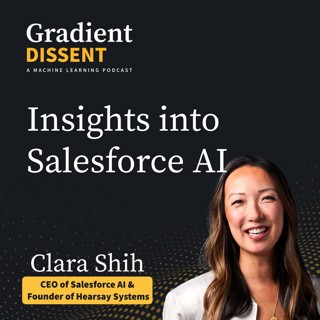
Transforming Data into Business Solutions with Salesforce AI CEO, Clara Shih
🚀 In this episode of Gradient Dissent, we explore the revolutionary impact of AI across industries with Clara Shih, CEO of Salesforce AI and Founder of Hearsay Systems. Dive into Salesforce AI's cutting-edge approach to customer service through AI, the importance of a trust-first strategy, and the future of AI policies and education. Learn how Salesforce empowers businesses and shapes the future with AI innovations like Prompt Builder and Copilot Studio. Whether you're an AI enthusiast, a business leader, or someone curious about the future of technology, this discussion offers valuable insights into navigating the rapidly evolving world of AI.✅ Subscribe to Weights & Biases YouTube → https://bit.ly/45BCkYz🎙 Get our podcasts on these platforms:Apple Podcasts: http://wandb.me/apple-podcastsSpotify: http://wandb.me/spotifyGoogle: http://wandb.me/gd_googleConnect with Clara:https://www.linkedin.com/in/clarashih/https://x.com/clarashih?s=20 Follow Weights & Biases:https://twitter.com/weights_biases https://www.linkedin.com/company/wandb
14 Maalis 202458min
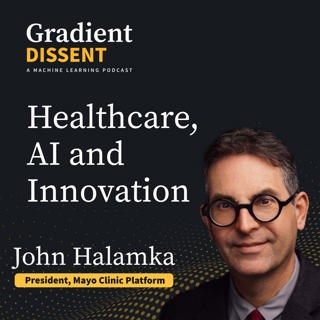
Upgrading Your Health: Navigating AI's Future In Healthcare with John Halamka of Mayo Clinic Platform
In the newest episode of Gradient Dissent, we explore the intersecting worlds of AI and Healthcare with John Halamka, President of the Mayo Clinic Platform.Journey with us down John Halamka's remarkable path from his early tech startup days to leading innovations as the President of the Mayo Clinic Platform, one of the world's most esteemed healthcare institutions. This deep dive into AI's role in modern medicine covers the technology's evolution, its potential to redefine patient care, and the visionary work of Mayo Clinic Platform in harnessing AI responsibly.Explore the misconceptions surrounding AI in healthcare and discover the ethical and regulatory frameworks guiding its application. Glimpse into the future with Halamka's visionary perspective on AI's potential to democratize and revolutionize healthcare across the globe. Join us for an enlightening discussion on the challenges, triumphs, and the horizon of AI in healthcare through the lens of John Halamka's pioneering experiences.🎙 Get our podcasts on these platforms:Apple Podcasts: http://wandb.me/apple-podcastsSpotify: http://wandb.me/spotifyGoogle: http://wandb.me/gd_googleYouTube: http://wandb.me/youtube✅ Follow Weights & Biases:https://twitter.com/weights_biases https://www.linkedin.com/company/wandb
29 Helmi 20241h 4min
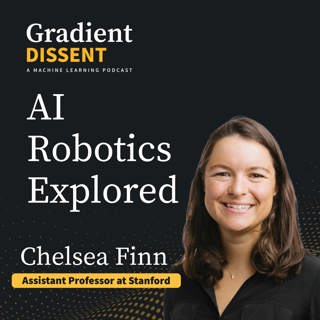
Shaping the World of Robotics with Chelsea Finn
In the newest episode of Gradient Dissent, Chelsea Finn, Assistant Professor at Stanford's Computer Science Department, discusses the forefront of robotics and machine learning.Discover her groundbreaking work, where two-armed robots learn to cook shrimp (messes included!), and discuss how robotic learning could transform student feedback in education.We'll dive into the challenges of developing humanoid and quadruped robots, explore the limitations of simulated environments and discuss why real-world experience is key for adaptable machines. Plus, Chelsea will offer a glimpse into the future of household robotics and why it may be a few years before a robot is making your bed.Whether you're an AI enthusiast, a robotics professional, or simply curious about the potential and future of the technology, this episode offers unique insights into the evolving world of robotics and where it's headed next.*Subscribe to Weights & Biases* → https://bit.ly/45BCkYz🎙 Get our podcasts on these platforms:Apple Podcasts: http://wandb.me/apple-podcastsSpotify: http://wandb.me/spotifyGoogle: http://wandb.me/gd_googleYouTube: http://wandb.me/youtubeConnect with Chelsea Finn:https://www.linkedin.com/in/cbfinn/ https://twitter.com/chelseabfinnFollow Weights & Biases:https://twitter.com/weights_biases https://www.linkedin.com/company/wandb Join the Weights & Biases Discord Server:https://discord.gg/CkZKRNnaf3
15 Helmi 202453min
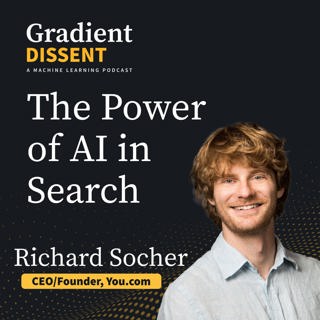
The Power of AI in Search with You.com's Richard Socher
In the latest episode of Gradient Dissent, Richard Socher, CEO of You.com, shares his insights on the power of AI in search. The episode focuses on how advanced language models like GPT-4 are transforming search engines and changing the way we interact with digital platforms. The discussion covers the practical applications and challenges of integrating AI into search functionality, as well as the ethical considerations and future implications of AI in our digital lives. Join us for an enlightening conversation on how AI and you.com are reshaping how we access and interact with information online.*Subscribe to Weights & Biases* → https://bit.ly/45BCkYzTimestamps: 00:00 - Introduction to Gradient Dissent Podcast 00:48 - Richard Socher’s Journey: From Linguistic Computer Science to AI 06:42 - The Genesis and Evolution of MetaMind 13:30 - Exploring You.com's Approach to Enhanced Search 18:15 - Demonstrating You.com's AI in Mortgage Calculations 24:10 - The Power of AI in Search: A Deep Dive with You.com 30:25 - Security Measures in Running AI-Generated Code 35:50 - Building a Robust and Secure AI Tech Stack 42:33 - The Role of AI in Automating and Transforming Digital Work 48:50 - Discussing Ethical Considerations and the Societal Impact of AI 55:15 - Envisioning the Future of AI in Daily Life and Work 01:02:00 - Reflecting on the Evolution of AI and Its Future Prospects 01:05:00 - Closing Remarks and Podcast Wrap-Up🎙 Get our podcasts on these platforms:Apple Podcasts: http://wandb.me/apple-podcastsSpotify: http://wandb.me/spotifyGoogle: http://wandb.me/gd_googleYouTube: http://wandb.me/youtubeConnect with Richard Socher:https://www.linkedin.com/in/richardsocher/ https://twitter.com/RichardSocher Follow Weights & Biases:https://twitter.com/weights_biases https://www.linkedin.com/company/wandb Join the Weights & Biases Discord Server:https://discord.gg/CkZKRNnaf3
1 Helmi 20241h 8min
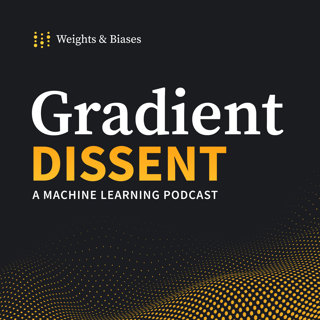
AI’s Future: Investment & Impact with Sarah Guo and Elad Gil
Explore the Future of Investment & Impact in AI with Host Lukas Biewald and Guests Elad Gill and Sarah Guo of the No Priors podcast.Sarah is the founder of Conviction VC, an AI-centric $100 million venture fund. Elad, a seasoned entrepreneur and startup investor, boasts an impressive portfolio in over 40 companies, each valued at $1 billion or more, and wrote the influential "High Growth Handbook."Join us for a deep dive into the nuanced world of AI, where we'll explore its broader industry impact, focusing on how startups can seamlessly blend product-centric approaches with a balance of innovation and practical development.*Subscribe to Weights & Biases* → https://bit.ly/45BCkYzTimestamps:0:00 - Introduction 5:15 - Exploring Fine-Tuning vs RAG in AI10:30 - Evaluating AI Research for Investment15:45 - Impact of AI Models on Product Development20:00 - AI's Role in Evolving Job Markets25:15 - The Balance Between AI Research and Product Development30:00 - Code Generation Technologies in Software Engineering35:00 - AI's Broader Industry Implications40:00 - Importance of Product-Driven Approaches in AI Startups45:00 - AI in Various Sectors: Beyond Software Engineering50:00 - Open Source vs Proprietary AI Models55:00 - AI's Impact on Traditional Roles and Industries1:00:00 - Closing Thoughts Thanks for listening to the Gradient Dissent podcast, brought to you by Weights & Biases. If you enjoyed this episode, please leave a review to help get the word out about the show. And be sure to subscribe so you never miss another insightful conversation.Follow Weights & Biases:YouTube: http://wandb.me/youtubeTwitter: https://twitter.com/weights_biases LinkedIn: https://www.linkedin.com/company/wandb Join the Weights & Biases Discord Server:https://discord.gg/CkZKRNnaf3#OCR #DeepLearning #AI #Modeling #ML
18 Tammi 20241h 4min

Revolutionizing AI Data Management with Jerry Liu, CEO of LlamaIndex
In the latest episode of Gradient Dissent, we explore the innovative features and impact of LlamaIndex in AI data management with Jerry Liu, CEO of LlamaIndex. Jerry shares insights on how LlamaIndex integrates diverse data formats with advanced AI technologies, addressing challenges in data retrieval, analysis, and conversational memory. We also delve into the future of AI-driven systems and LlamaIndex's role in this rapidly evolving field. This episode is a must-watch for anyone interested in AI, data science, and the future of technology.Timestamps:0:00 - Introduction 4:46 - Differentiating LlamaIndex in the AI framework ecosystem.9:00 - Discussing data analysis, search, and retrieval applications.14:17 - Exploring Retrieval Augmented Generation (RAG) and vector databases.19:33 - Implementing and optimizing One Bot in Discord.24:19 - Developing and evaluating datasets for AI systems.28:00 - Community contributions and the growth of LlamaIndex.34:34 - Discussing embedding models and the use of vector databases.39:33 - Addressing AI model hallucinations and fine-tuning.44:51 - Text extraction applications and agent-based systems in AI.49:25 - Community contributions to LlamaIndex and managing refactors.52:00 - Interactions with big tech's corpus and AI context length.54:59 - Final thoughts on underrated aspects of ML and challenges in AI.Thanks for listening to the Gradient Dissent podcast, brought to you by Weights & Biases. If you enjoyed this episode, please leave a review to help get the word out about the show. And be sure to subscribe so you never miss another insightful conversation.Connect with Jerry:https://twitter.com/jerryjliu0https://www.linkedin.com/in/jerry-liu-64390071/Follow Weights & Biases:YouTube: http://wandb.me/youtubeTwitter: https://twitter.com/weights_biases LinkedIn: https://www.linkedin.com/company/wandb Join the Weights & Biases Discord Server:https://discord.gg/CkZKRNnaf3#OCR #DeepLearning #AI #Modeling #ML
4 Tammi 202457min

Bridging AI and Science: The Impact of Machine Learning on Material Innovation with Joe Spisak of Meta
In the latest episode of Gradient Dissent, we hear from Joseph Spisak, Product Director, Generative AI @Meta, to explore the boundless impacts of AI and its expansive role in reshaping various sectors. We delve into the intricacies of models like GPT and Llama2, their influence on user experiences, and AI's groundbreaking contributions to fields like biology, material science, and green hydrogen production through the Open Catalyst Project. The episode also examines AI's practical business applications, from document summarization to intelligent note-taking, addressing the ethical complexities of AI deployment. We wrap up with a discussion on the significance of open-source AI development, community collaboration, and AI democratization. Tune in for valuable insights into the expansive world of AI, relevant to developers, business leaders, and tech enthusiasts.We discuss:0:00 Intro0:32 Joe is Back at Meta3:28 What Does Meta Get Out Of Putting Out LLMs?8:24 Measuring The Quality Of LLMs10:55 How Do You Pick The Sizes Of Models16:45 Advice On Choosing Which Model To Start With24:57 The Secret Sauce In The Training26:17 What Is Being Worked On Now33:00 The Safety Mechanisms In Llama 237:00 The Datasets Llama 2 Is Trained On38:00 On Multilingual Capabilities & Tone43:30 On The Biggest Applications Of Llama 247:25 On Why The Best Teams Are Built By Users54:01 The Culture Differences Of Meta vs Open Source57:39 The AI Learning Alliance1:01:34 Where To Learn About Machine Learning1:05:10 Why AI For Science Is Under-rated1:11:36 What Are The Biggest Issues With Real-World ApplicationsThanks for listening to the Gradient Dissent podcast, brought to you by Weights & Biases. If you enjoyed this episode, please leave a review to help get the word out about the show. And be sure to subscribe so you never miss another insightful conversation.#OCR #DeepLearning #AI #Modeling #ML
7 Joulu 20231h 14min
